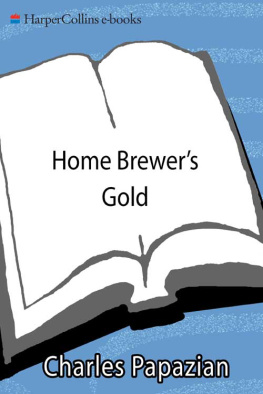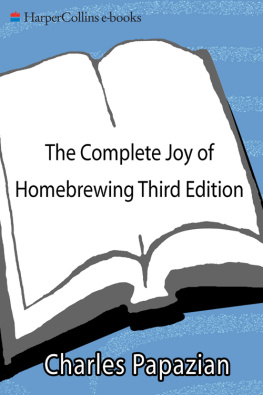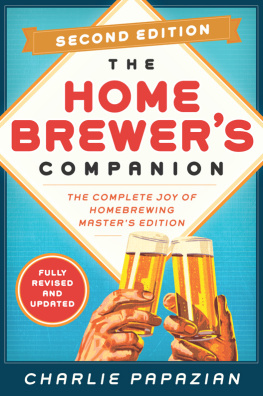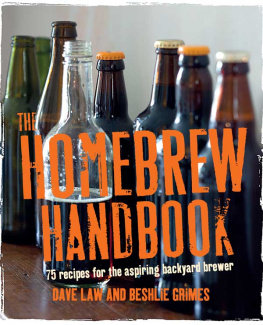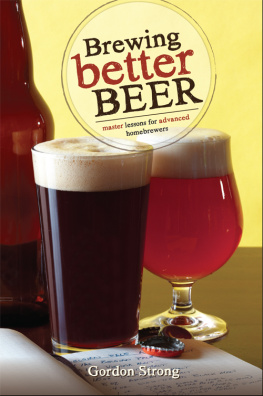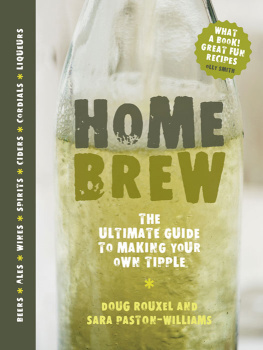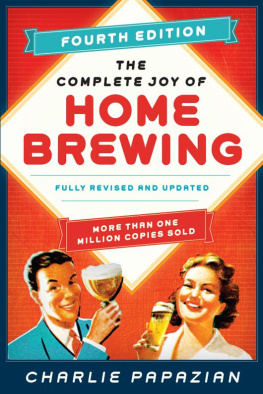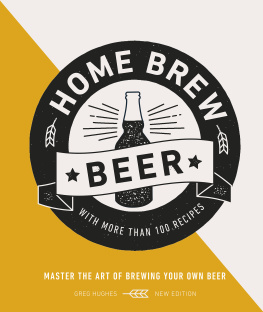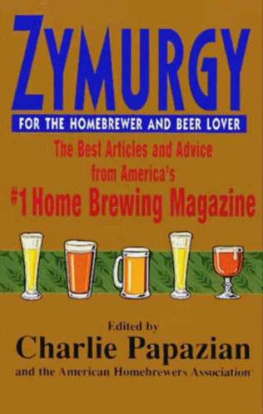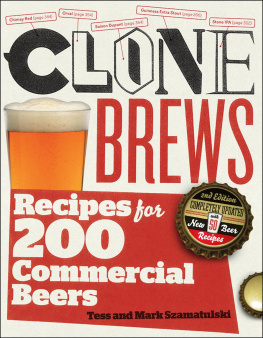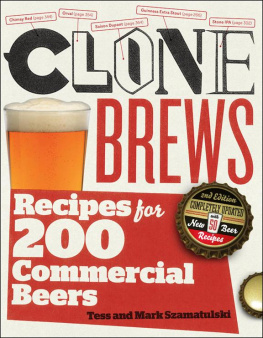Home Brewers Gold is designed and written with a respect for the devotion of the worlds commercial brewers and the passion of todays homebrewers. Its intention is to help inspire the evolution of todays beer cultures and to develop even greater appreciation for the craft of brewing.
This book is about more than just homebrewing the winning beers of the 1996 World Beer Cup International Competition. The origins of every brewery can be traced to the spirit of home. Whether it was simple appreciation with friends and family or a passion to brew, one can certainly find an essential flame, an essential spirit belonging to all brewers.
Homebrewers are special. In every century, in every land, in every community, homebrewers represent the appreciation of craft, art and science and the special way brewing can contribute to the quality life in all communities. Todays homebrewers find themselves admired for their creativity and their passion for revitalizing an appreciation for the worlds great beers, past, present and future.
I could not have developed, formulated and written this book without the participation of all brewers. Winning brewers were most generous in providing brewery and beer recipe information that helped in my recipe formulations.
Special thank-yous to Marcia Schirmer, who directed the event; to Jeanne and Glenn Colon-Bonet, who managed the competition; to Sharon Mowry, who managed all of the shipping and organizing of the beer; and to Rebecca Bradford, who managed the staging. Thanks also go to Sheri Winter, Cathy Ewing, Bob Pease, Kyle Keazer and Melinda Bywaters, all staff of the Association of Brewers who contributed to the production of the event. Special acknowledgment must be given to the U.S. Bureau of Alcohol, Tobacco and Firearms (BATF). Their understanding of the World Beer Cup purpose and their cooperation and assistance in helping entries legally clear U.S. Customs made the event possible in the United States. A big thank-you to Mark Snyder, my project assistant, who collected all of the brewery-related data and information. Again, as with my book The Home Brewers Companion, I thank Tracy Loysen for helping me with preliminary editing of my manuscript. Finally, thank-you to Tom Nelson of TKO Software, developer of Brewers Workshop, used to assist me in calculating recipes.
It was a brisk, chilly winters afternoon in midtown New York City. I had been in the city and Long Island visiting local brewpubs and homebrewers, and on this particular afternoon my editor, Stephen Power at Avon Books, had invited me to drop by to see him and have lunch at a small Italian restaurant. He had an idea he wanted to pass by me. The traffic outside and the waiters and waitresses inside scurried around, relatively oblivious to the quiet conversations at each table. Ill have abeer, please. Ill have the same, added Stephen. What beer did we choose? Well, if the brewer ever asks, Ill confess, but that will be between Stephen, the brewer and me, for the time being.
Now, what was this idea? I came across the Wall Street Journals article about your Association of Brewers announcement of The World Beer CupWhat about a book on brewing the winning recipes? That was halfway through the first beer.
My immediate reactions were two. Why didnt I think of that? and How the hell am I going to be able to formulate nearly sixty recipes and maintain my credibility? I finished my beer and had another. Things became clearer.
Its not my full-time job to think of ideas for books. The first question was easy to answer. Stephen was good at his job. Now then, could I do it? After all, I truly admire and respect the brewers around the world and the quality of their products. The idea of attempting to formulate and present 5-gallon recipes that match the character of their beer was, well, intimidating. I had always invented my own recipes before. Id hardly ever tried to duplicate someone elses beer. The challenge intrigued me. I thought of having another beer, but I knew better. So I did. Let me think about this one, Stephen. I know it could be done. Its whether I can make a quality presentation and feel Ive ethically represented both the World Beer Cup and the winning beers and breweries in a fair fashion, while offering practical and useful information to homebrewers. Those werent my exact words, but surely these thoughts whirled in my head at such a grandly bold project.
One month later I decided. Yes I would. What remained so uncertain was whether I could really formulate recipes from just tasting the beer. This was the bottom line. There was a possibility I would have to rely solely on my own skills as a brewer and taster. Yes, I would ask each of the winning breweries for technical information regarding ingredients and measurements, but how forthcoming would they be? What if none of them was willing to divulge information, considering it a trade secret? Then I thought, Hell, Ive been brewing for twenty-six years and thats got to be worth something.
The World Beer Cup was staged in June of 1996. The winners were announced and my work began. But I really didnt realize the magnitude of what I had gotten myself into until the van delivered to my home fifteen cases of beer, two bottles each of the first, second and third-place winning beers. They were cold when they arrived and were immediately placed into a 6-by-9-foot walk-in cooler that I had just finished having constructed especially for these beers. The fifteen cases of beer secured, I slammed the cooler door shut. As the delivery van pulled away that warm Tuesday summer afternoon, I sat on a wooden crate. I cant quite sort out exactly what I was feeling. I dont think I ever will. Was it total elation, joy, and whoopee? I was going to have to drink 146 different kinds of the best beers in the world at my leisure at home. Or was it an overwhelming feeling of despair and hopelessness overcoming me? I had to taste and take notes on 146 different beers and formulate recipes for 52 of them.
I was in a quandary, so 1 poured myself a bottle of homebrew, looked at it, smelled it, drank the whole thing, and then resigned myself with a sigh. Oh well, its a tough job, but someones got to do it.
And this is how the summer of 1996 officially got under way for me and my favorite tree. You see, I was thinking of each and every one of you who are homebrewers, beer enthusiasts and professional brewers every time 1 poured myself one of those beers. You would have often found me outside at the picnic table on my deck, tasting four to eight beers at a sitting, laptop computer positioned front and center, emitting its eerie light onto my face, my special tasting glass always within arms reach, as well as a pitcher of water for rinsing glasses and the Styrofoam box maintaining the beers chill. I was thinking of you every time I finished evaluating one of those 146 different and remarkably great beers. The pleasure was all mine, but only two or three ounces at a time. Oh yes, I thought of all of you each time the remainders went shooting into the air, cast over my shoulder, splashing against what has become for me over time a very special tree. The trees roots awaited the agitated white and brown beer foam that trickled down its trunk and into the ground. That summer it was a very happy tree.
But now its your turn to experience what my friend the beer tree enjoyed all summer long. Using your skills as a homebrewer in conjunction with my recipe formulations and tasting notes, I believe that you, too, can enjoy the authentic character of some of the worlds best beers. The most important thought to keep in mind is that a recipe does not a beer make. A beer is made using the skills of a brewer and the interaction of ingredients, process and packagingall unique circumstances for every brewer in the world. The influence that equipment, process control and particular ingredients have on the final product cannot be underestimated. All of us as brewers have developed our own techniques and equipment adaptations. In many cases these recipes will only be a beginning point for achieving the winning character. For many of you the first attempt at using these recipes will be an unparalleled success. Surely each time you will brew excellent beer. But getting the exact balance of characters may take time as you adjust these recipes to conform to your own manner of brewing. That is what the craft of homebrewing is all aboutknowing when and how to adapt to achieve the desired end.

